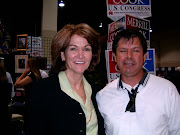
Utah's Curtis has about $400K in campaign accounts he could keep
By Bob Bernick Jr. and Lee Davidson
Deseret News
Published: November 15, 2008
The 18 Utah legislators who retired this year — either voluntarily or by voters' choice — have nearly a combined half-million dollars sitting in campaign accounts, money that they currently can just give to themselves, spend on a future campaign or dole out to whomever they wish.
By far most of that cash belongs to House Speaker Greg Curtis, R-Sandy, who was defeated Nov. 4 by Democratic challenger Jay Seegmiller. Curtis has $281,865 in his campaign account — and another $99,081 in his political action committee — the latest pre-election financial reports show.
But Sen. Carlene Walker, R-Cottonwood Heights, who also lost in the general election, is no cash slacker — she has $32,000. And Sen. Darin Peterson, R-Nephi, who briefly sought re-election last spring before getting out of his race, has nearly $30,000. Retiring Sen. Dan Eastman, R-Bountiful, has about $22,000.
That is not chump change.
And while Gov. Jon Huntsman Jr. and GOP and Democratic lawmakers alike are talking about changing the current campaign funding law to restrict state candidates and officeholders from giving themselves campaign money, it is questionable whether such a new law coming out of the 2009 Legislature could be retroactive to current campaign cash.
Utah allows campaign accounts to be spent on any legal activity. And in years gone by, some candidates and officeholders, and some former officeholders, have given themselves campaign cash.
Considering that among the current crop of 18 retiring legislators, 76 percent of their campaign money in their last year for which disclosure forms are available came from special interest groups, a Deseret News analysis of their latest filings shows, then, in effect, they could be retiring on cash from lobbyists and special interests who sought special favors from them.
Can such a thing really happen, one may ask?
Yep. For example, Rep. Jack Draxler, R-North Logan, gave himself $6,300 last year from his campaign account, telling the newspaper that he is self-employed and he lost more than that through the 45-day general session and other legislative work days when he couldn't earn his regular pay. (Legislators make around $15,000 a year in state pay and expenses.)
And it has become rather regular for some retiring/retired legislators to donate big chunks of their campaign accounts to charities.
Previous bills on restrictions to campaign account expenses — and current talk about putting some limits on such spending — all include exceptions for donating campaign money to a bona fide charity. So it is likely that charitable giving will still be allowed under any new law restricting campaign account spending.
Curtis could not be reached for comment on this story. However, he has previously said that he would not take any of his campaign cash himself, but may give to other candidates, his party or to charity.
And he may seek higher office down the road. Curtis' nearly $400,000 (in PAC and campaign cash) would be a good jump-start for a campaign for governor, Congress or attorney general.
Other high-profile legislators have also raised a lot of cash for a political rainy day. For example, former House Speaker Marty Stephens raised several hundred thousand dollars while he was speaker and spent a chunk of it on his failed 2004 run for governor. And current Rep. Kevin Garn, R-Layton, kept about $45,000 in his Utah House account even after he lost a run for the U.S. House in 2002, and spent that money when he ran successfully for his Utah House seat again in 2006.
Eastman was one of the few retiring members who would comment on plans for his leftover money — about $22,000. He said he plans to give about half to charity, most of the rest to other politicians and maybe some for himself. "But I don't plan to be buying any plasma TVs for myself," he joked.
He said he does not favor restricting how campaign accounts can be used. "You elect honorable people, and they will use it in honorable ways," he said.
Eastman added that while he raised more than he needed in his last election, much of what is left over will go to "several Senate friends and other candidates who are deserving" and have similar political goals as he does.
While Eastman dislikes campaign-fund restrictions, he does support banning all gifts from lobbyists — another controversial political money issue.
Of note, exactly how much money retiring members have is often unknown. If they are not active candidates, they do not need to file disclosure forms — showing how much they are raising and how they have been spending it — until January, or just after they officially leave office.
________________________________________
E-mail: bbjr@desnews.com; lee@desnews.com
© 2008 Deseret News Publishing Company | All rights reserved
All this cash should be donated to children’s charities’. - Alex





























